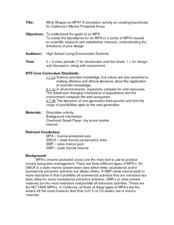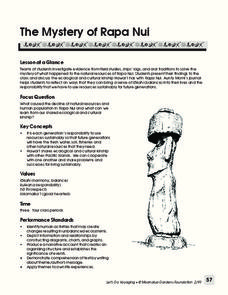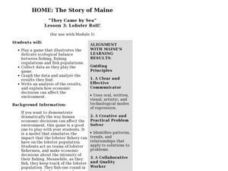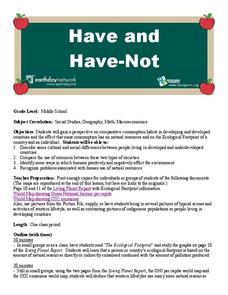Curated OER
Welcome to Populations!
Students define what population is in their own words. In this biology instructional activity, students explain different ways to measure population density. They interpret population graphs.
Curated OER
The Ghost of Populations Past
Middle schoolers study population distribution and survivorship curves by collecting data regarding age of death of humans from either tombstones, newspapers, or other community resources. Students analyze data by creating graphs and...
Michigan State University
Bug Lyphe!
Introduce ecology classes to biodiversity and interdependence in ecosystems with a PowerPoint presentation. Then, they get up-close and personal with the invertebrate world by collecting insects, classifying them, and graphing their...
Curated OER
Ecology: Factors Influencing Animal Populations
Students assess the factors affecting animal populations. Working in groups they define specific vocabulary terms and complete several activities from "Project Wild."
Curated OER
Personal Ecosystem
Students build an aquatic ecosystem using large glass pickle jars. In this ecology lesson, students build and ecosystem then observe and collect data on the habitats. In this long term project students observe a...
Curated OER
Land Use Unit
Pupils identify factors in human society and the natural environment aree interdependent. They analyze interdependencies demonstrated in various situations and occurances.
Curated OER
Hare and Lynx Population
Fourth graders study changes in animal population. For this graphing lesson, 4th graders create graphs from information read to them about hares and lynx populations. They will describe patterns of change in the graphs and discuss why...
Curated OER
The Disappearing Fish
Students examine the theories behind the drastic decline of the wild salmon population and the ecological ramifications of this decline.
Curated OER
Down, Dung and Dirty
Students observe the changes seen in succession and the biodiversity of a community through its species richness and evenness. They create a dung culture in a clear plastic cup from horse, goat or cow dung then observe the numbers of...
Curated OER
What Shapes a MPA?
Learners identify the three types of MPA in California. For this marine science lesson, students analyze information provided to design a new MPA. They justify their reasoning in class.
Curated OER
Exploration of "Pillbugs"
Fifth graders define vocabulary terms, identify the characteristics of a pillbug, and create a dichotomous key. Then they examine the pillbugs and make observations and record these observations. Finally, 5th graders observe specific...
Curated OER
Appearances Are Deceiving
Young scientists study creeks around their area to see how clean the water really is. One way to tell is by the invertebrate populations that are present. This lesson introduces a game which learners simulate a variety of species found...
Earth Watch Institute
Entering Local Groundhog Data in an Excel Spreadsheet
Here is a cross-curricular ecology and technology lesson; your learners create spreadsheets depicting the location and number of groundhog dens in a local park. They research groundhogs and analyze data about where the groundhog...
Curated OER
Ecology and the Conservation of Natural Resources Lesson 2
Students compare and contrast abiotic and biotic factors. They discuss how these factors effect ecosystems. They answer questions to complete the lesson.
Curated OER
The Environment and Interactions of Living Organisms
Young scholars study the environment and interactions of living organisms. They identify abiotic and biotic factors and create a foldable and vocabulary cards. They create a poster illustrating soil and watch a video to study symbiosis.
Moanalua Gardens Foundation
The Mystery of Rapa Nui
What caused the collapse of the environment on Rapa Nui (Easter Island)? Who constructed the Moai? What was their purpose? Class members assume the role of investigators and use evidence drawn from field studies, ships' logs, and...
Curated OER
Repopulating Michigan's Waterways
Eleventh graders identify the parts of an ecosystem and how communities change over time. In this ecology lesson students formulate a habitat restoration plan.
Curated OER
Pika Chew
Students work in collaborative teams with specific roles, use the Internet to research the behavior and ecology of pikas, make predictions about survival rates of pikas in different habitats and organize their data in graphs.
Curated OER
Wolves
Students explore wolves. In this ecology and wolves lesson, students research predator-prey relationships on the Internet and complete a related worksheet with a partner. Students interpret data on bar graphs to determine growth and...
Curated OER
Finding the Basal Area of a Forest Plot to Determine Stocking Levels
Students use graphs and plots to measure the basal area and stocking levels. In this graphing instructional activity students work in the field the use their data to help them complete a lab activity.
Curated OER
Fish Parasite Survey
Students survey and dissect as many fish as possible. They count nematodes, cestodes and crustaceans on the fish, fill out autopsy reports, and transfer data to a chalkboard data table. Students graph the results of the entire class...
Curated OER
Lesson 3: Lobster Roll!
Students play a game that illustrates the delicate ecological balance between fishing, fishing regulations and fish populations. They collect data and analyze the results.
Curated OER
Environment: The Haves and the Have Nots
Pupils examine consumption habits in developed and developing countries and determine their effects on natural resources. In groups, they assess graphs on the Living Planet Report and observe the connection between consumption and...
Curated OER
Native Species Restoration: Is Saving One Species Hurting Another?
Students investigate the effect of human activities upon the environment. The studying experience encourages students to think about the issues involved in native species restoration.























